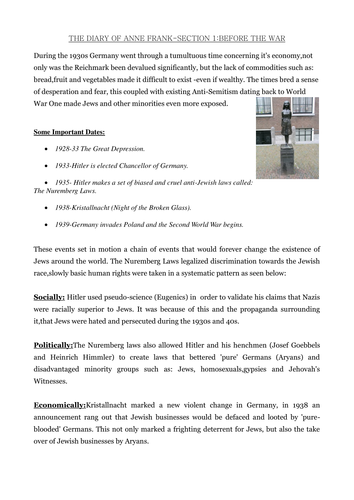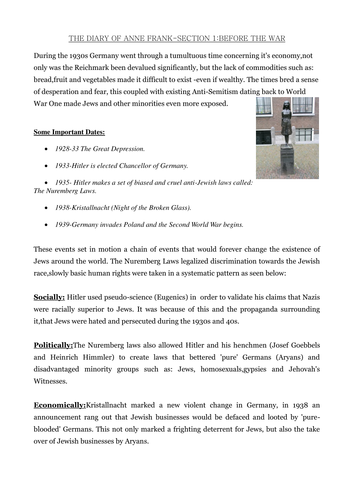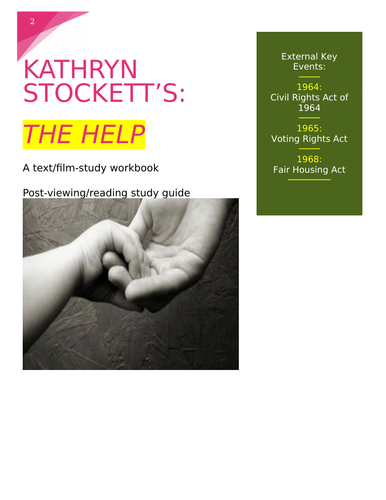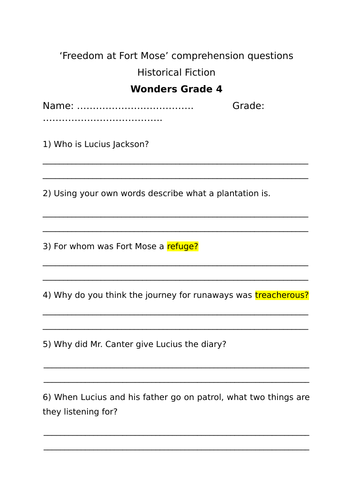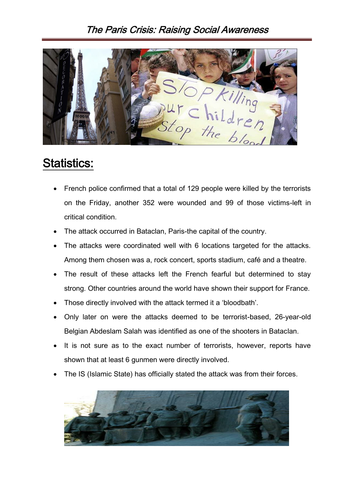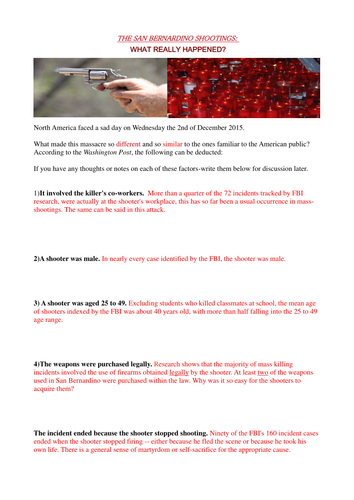97Uploads
19k+Views
875Downloads
History

Introduction to Indigenous Australian History
The focus of this study guide and worksheet set is to introduce students to Indigenous Australian clans. It also has a critical thinking task on cultural heritage, which encourages students to discuss their findings.

Anne Frank and World War II (Events Leading to the Discrimination of Jews)
This resource is a worksheet on the start of the second world war in the context of Anne Frank and the Holocaust.It details important historical events that influenced the treatment of Jews and other minority groups.

Anne Frank and World War II (Events Leading to the Discrimination of Jews)
This resource is a worksheet on the start of the second world war in the context of Anne Frank and the Holocaust.It details important historical events that influenced the treatment of Jews and other minority groups.

The Help Post-reading/Viewing Workbook
This resource is the accompanying booklet to: The Help - Pre -reading/viewing workbook.
It builds on the knowledge gained from the story and aims to illicit critical thinking responses in students.
The guide has:
Key historical dates
Extended discussion questions and written response task
Fill in the gap activity (short response)
Brainstorming activity/space
Final essay question for practice (long response)

The Attacks on France: Creating Social Awareness
This resource is a set of worksheets that deal with the Paris Bombings on November 13th 2015 by terrorist groups. It is designed to create an open discussion among students for important social and cultural awareness development. There are 4 activities in total with one possible expansion topic dealing with research on the nature of terrorism.

Indigenous Australian History- migration and languages
This resource discusses Indigenous Australian migration and language. It also has a critical thinking question about the cultural importance of land.

Grade 4 Wonders (McGraw-Hill) Reading Comprehension Unit 6 week 2
This is an extension activity to the unit 6 week 2 topic: ‘Untold Stories’.
The comprehension is titled: Freedom at Fort Mose
It covers the Historical Fiction genre.
The resource has ten questions relating to the text and one paragraph/reflection question.

The Attacks on France: Creating Social Awareness
This resource is a set of worksheets that deal with the Paris Bombings on November 13th 2015 by terrorist groups. It is designed to create an open discussion among students for important social and cultural awareness development. There are 4 activities in total with one possible expansion topic dealing with research on the nature of terrorism.

Propaganda: A critical study (Part 1)
Purpose: This first part explores Edward Filene’s seven criteria for identifying propaganda.
The slides define propaganda and it’s origin/popularity,and also include common elements of propaganda.
This resource is aimed at students in the following subjects:
Social Sciences (Historical Sciences)
Literary study and analysis
Critical Thinking

The San-Bernardino Massacre: Why Was this Such an Unusual Shooting?
This resource can be used as a single unit of work or as a point of reference for discussions and assessments. It tackles issues on gun laws in North America and the right to bear arms. It also has an in-depth section dealing with the unusual aspects of the events-what made this shooting so different from most others? Lastly, the resource covers the similarities of the event and why it has some likeness to other massacres of the decade.

'Anne Frank: Diary of a Young Girl'/The Holocaust (Workbook and Homework Units)
The purpose of this resource is to not only explain the historical context of the Holocaust, but also show the social significance it had on a personal level for the Jewish nation. The source uses the context of 'Anne Frank: Diary of a Young Girl' to explain this in depth.
The source has:
An introduction to Jewish Persecution
An Introduction to 1933 Nazi Germany
An introduction of the novel and it's characters
12 homework units based on each chapter of the book

Apartheid and Segregation in South Africa- Activity and word glossary
This worksheet is essential to those teaching Apartheid within higher levels of high school, it has a basic list of terms that students will likely encounter when studying this section. It also has a song activity (protest music of the Apartheid era) and a definition section on the aforementioned terms.

Critical Thinking Task: Refugees-Allow or Refuse Entrance?
The task focuses on the long-debated question- whether refugees deserve to seek refuge in safer countries or whether they should not be allowed entry to first world countries.The lesson includes 2 clip sets that can be shown in class, a series of questions allowing for critical thinking and a short-essay section in which students argue for or against this topic.

'Anne Frank: Diary of a Young Girl'/The Holocaust (Workbook and Homework Units)
The purpose of this resource is to not only explain the historical context of the Holocaust, but also show the social significance it had on a personal level for the Jewish nation. The source uses the context of 'Anne Frank: Diary of a Young Girl' to explain this in depth.
The source has:
An introduction to Jewish Persecution
An Introduction to 1933 Nazi Germany
An introduction of the novel and it's characters
12 homework units based on each chapter of the book

Critical Thinking Task: Refugees-Allow or Refuse Entrance?
The task focuses on the long-debated question- whether refugees deserve to seek refuge in safer countries or whether they should not be allowed entry to first world countries.The lesson includes 2 clip sets that can be shown in class, a series of questions allowing for critical thinking and a short-essay section in which students argue for or against this topic

Character Analysis of the Novel : 'The Help'
This resource explains each of the characters from the 2009 novel: 'The Help'. It explains the context and background of each character as well as the historical background of the time, such as: the Jim Crow laws and segregation.

Introduction to Crow Country by Kate Constable
Crow Country by Kate Constable introduction PPT
(20 slides/duration: approximately 1 hr.)
A set success criteria and learning intentions
Pre-reading section: key facts about Kate Constable’s novel.
Extensive introduction to 12 important characters in the novel. These slides discuss their characteristics, motivations and relationship to other characters and events in the narrative.
Nuanced focus- what is Crow Country really about? (Aboriginal connections to land, 1788 and the impact of colonialism). Viewing Crow Country through a lens that supports and understands Aboriginal tradition and cultural norms.
Brainstorming task: focussing on making inferences and researching about Boort.
Reflection of success criteria and learning intentions at the end of the PPT, here the focus is to ask students to take accountability for their understanding and let you know what they easily understood and what they require more assistance with.
Australian national standards for all Australian teachers targeted in this lesson.
YEAR 7
AC9E7LA01
AC9E8LA03
YEAR 8
AC9E8LY02
YEAR 9
AC9E9LY03
YEAR 10
AC9E10LA01

Crow Country by Kate Constable CH 1-3 Novel Study
Crow Country by Kate Constable CH 1-3 PPT
(20 slides/duration: approximately 1 hr.)
A set success criteria and learning intentions
While-reading session, chapters 1-3 with 4 key themes for students to highlight or annotate.
guided questions for chapter one, two and three to help students in the post-reading phase.
Super fun and creative storyboarding activity: map the initial interaction between the crows and Sadie.
Bigger-picture prompt: SS write an analytical response to text based on chapters 1,2,3 of Crow Country. T. guides and models the final answer.
Extension Question using the TEEL formula. T. reviews the TEEL acronym and asks students to structure their own responses for submission. The task asks students to use their prior-knowledge from chapters 1-3 of Crow Country to establish an answer.
Reflection of success criteria and learning intentions at the end of the PPT, here the focus is to ask students to take accountability for their understanding and let you know what they easily understood and what they require more assistance with.
I hope that this lesson will help inspire your students and take the guesswork out of teaching Crow Country. Best of luck!
Some Australian national standards targeted in this lesson.
YEAR 7
AC9E7LA04
YEAR 8
AC9E8LA04
YEAR 9
AC9E9LE01
YEAR 10
AC9E10LA03

Crow Country by Kate Constable CH 4-6 Novel Study
Crow Country by Kate Constable CH 4-6 PPT
(17 slides/duration: approximately 1 hr.)
Important success criteria and learning intentions.
Chapter 1 Summary for students who need more scaffolding or did not attend the previous session.
Complete answers for chapter one questions. T can either present these in class or print them for absent students.
Chapter 2 Summary for students who need more scaffolding or did not attend the previous session.
Complete answers for previous chapter two questions. T can either present these in class or print them for absent students.
Chapter 3 Summary for students who need more scaffolding from their teacher.
Complete answers for previous chapter three questions. T. can present these in class or print them for absent students.
While-reading session: FOUR key themes to highlight or annotate.
Creative extension: SS. Use the information from the previous session to answer a creative task.
New comprehension questions for chapters 4,5 and 6.
Reflection of success criteria and learning intentions at the end of the PPT, here the focus is to ask students to take accountability for their understanding and let you know what they easily understood and what they require more assistance with.
Some Australian national standards targeted in this lesson.
YEAR 7
AC9E7LA01
YEAR 8
AC9E8LE02
YEAR 9
AC9E9LE02
YEAR 10
AC9E10LE03

The Thing Around your Neck -Cell Block 1 story lesson and analysis
A teacher’s dream!
A super easy and complete step-by-step to help students analyse the story Cell Block 1 by Chimamanda Adichie. Students can listen to Adichie’s Ted talk on ’ The Danger of a Single Story’ and then answer important inquiry questions based on the talk.
Then, there is a helpful guide on Adichie’s writing style and personal background before students access the slide on how to successfully annotate the writing piece. There is also a bank for students to record any useful quotes and metalanguage as they read.


